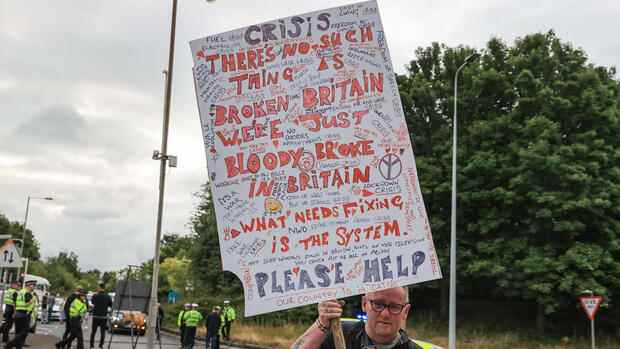The prices at the pump have risen by almost 50 percent within a year.
(Photo: IMAGO/News Images)
London The rising cost of living has led to the first social protests in Great Britain. Demonstrators paralyzed parts of the British motorway network on Monday morning to protest against the sharp rise in fuel prices. There were blockages on the busy M4 to Wales. Angry citizens also protested in northern England and Scotland.
Motorists played football on the empty lanes. Elsewhere, car and truck drivers reduced their speed significantly. The police spoke of “serious traffic disruptions”.
The protests were organized via social media. Activists called for more tax breaks. The British Finance Minister Rishi Sunak had already reduced the petroleum tax by five pence per liter in March.
However, he was not able to stop the rapid rise in prices. The prices at the pump have risen by almost 50 percent within a year. As in Germany, the UK government has asked cartel watchdogs to investigate why the tax cuts have not been passed on to motorists.
Top jobs of the day
Find the best jobs now and
be notified by email.
The UK protests have also drawn comparisons to the yellow vest demonstrations in France, which swept the neighboring country in 2018 and 2019 and grew into a broad political protest movement.
Gone is the British silence
The Brits usually boast that they keep their cool even in the toughest of conditions. “Keep calm & carry on” has become a dictum in times of crisis since the Second World War.
In view of an inflation rate of more than nine percent recently and sharply rising energy and food costs, however, the British calm is over. More than 40,000 railway workers recently went on strike for higher wages.
The criminal defense lawyers paid by the state are also on hold. British Airways teachers, doctors and staff at Heathrow Airport have announced strikes. Even at the British financial regulator FCA, employees want to stop working this week in protest at real wage losses.
Employees are walking out this week in protest at falling real wages.
(Photo: IMAGO/ZUMA Wire)
Prime Minister Boris Johnson’s government has not yet found a way to counter the sharply rising costs. Chancellor of the Exchequer Sunak is trying to cushion the effects through direct state financial aid. However, he is powerless against the bottlenecks in the global supply chains and the consequences of the Ukraine war on the energy markets.
The Bank of England has apparently also thrown in the towel. Fed Chairman Andrew Bailey recently admitted that he had no remedy for 80 percent of price increases.
He recently warned that the economic crisis would hit Britain harder than other countries. Growth is weaker and inflation is higher and more stubborn, said the central banker. Inflation is expected to rise further to eleven percent by autumn.
More: Strikes and staff shortages – Where chaos threatens air travelers in Europe
